Deborah J. Ross's Blog, page 80
September 7, 2018
Short Book Reviews: An Unrealistic Depiction of Recovery
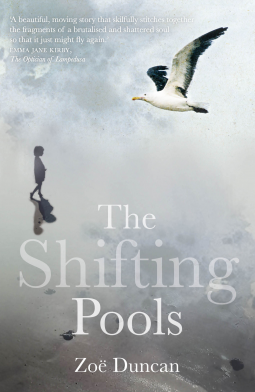 The Shifting Pools, by Zoë Duncan (Trafalgar Square Publishing)
The Shifting Pools, by Zoë Duncan (Trafalgar Square Publishing)
I requested a review copy of this book based on its description:
Fleeing war and the death of her family, Eve has carefully constructed a new life for herself in London. Yet she is troubled by vivid, disturbing dreams, symptoms of her traumatic past, which intrude increasingly on her daily life. As she is drawn further into her dream world, she finds herself caught up in a fresh battle for survival. A dark, lyrical fantasy about healing and reconnecting with the full richness of the self.
As the family member of a murder victim, I am especially interested in stories of survival and healing. Although competently written on a prose level, The Shifting Poolsturned out to be an example of telling the reader how to feel. (Actually, bashing the reader over the head.) Sections alternate between modern London, where Eve has begun psychotherapy (not, as the author says, psychoanalysis, a mistake that threw me out of the story!), Eve’s childhood trauma, Eve’s dreams that make no more sense than any other dreams, and a “fantasy” fairy tale that lacks the internal structure, sense, and mythic elements that make such a tale work psychologically.
Besides being confused by constantly switching from one brief scene to another, I found each thread unbelievable. I’ve already remarked on the fairy tale. Although Eve and her family are brutalized by an invading army, they read like an ordinary Western family. Given what has been happening to refugees in the past few centuries, this depiction of white privilege, with all its wealth and resources, struck me as shallow. Certainly, wealthy people can be victims of violence, but in this case there was the opening for a deeper cultural context.
More than that, modern Eve didn’t feel like a person grappling with buried trauma. Her journey into the dark places of her own psyche came across as superficial and trite, much too easily accomplished, without the soul-deep agony and strength of real survivors. The list of references at the end is light on psychology, and includes the outdated psychoanalytic work of Frankl and Jung but none of the modern understanding of PTSD and its treatment. Medication, CBT (cognitive behavioral therapy), EMDR (eye movement desensitization and reprocessing), PE (prolonged exposure) and other clinically proven methods aren’t even mentioned. The result might be poetic and overly dramatic but struck me as not at all realistic. My suggestion is to go spend some time with people who actually have survived PTSD and listen to how they talk because I didn’t believe Eve was one of them.
The usual disclaimer: I received a review copy of this book, but no one bribed me to say anything about it.

Published on September 07, 2018 01:00
September 6, 2018
A Belated 2018 WorldCon Report
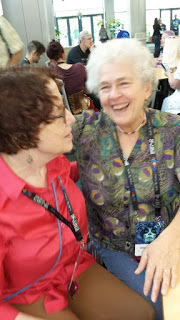 With fellow Book View Cafe author, Madeleine RobinsI confess to a love-hate relationship with big conventions. I love the energy. I love seeing friends and colleagues from all over the world, particularly since most of the time, I am something of a hermit, nesting in my redwood forest. The prospect of so many of us getting together in one place at one time is intoxicating. Likewise, the richness of the programming (in this case), the celebration of creators and fans, is powerfully attractive. On the other hand, big conventions like WorldCon never come at the right time in my life. There seems to be a universal constant that says t(WC) = D(stress)max, where t = time, WC = WorldCon, and D = Deborah.
With fellow Book View Cafe author, Madeleine RobinsI confess to a love-hate relationship with big conventions. I love the energy. I love seeing friends and colleagues from all over the world, particularly since most of the time, I am something of a hermit, nesting in my redwood forest. The prospect of so many of us getting together in one place at one time is intoxicating. Likewise, the richness of the programming (in this case), the celebration of creators and fans, is powerfully attractive. On the other hand, big conventions like WorldCon never come at the right time in my life. There seems to be a universal constant that says t(WC) = D(stress)max, where t = time, WC = WorldCon, and D = Deborah. This year was no exception. The reasons are many and mostly personal, but suffice it to say that when August rolled around, I had not had an emotional break or a chance to fully recover from earlier events. When I pushed “Send” to email the latest Darkover novel to the Marion Zimmer Bradley Literary Works Trust (which holds the copyright and must give their approval before it goes to the editor), I felt as if I needed a month’s “dodo time.” Dodo time being an expanse of possibilities without any expectations of productivity.
Nevertheless, I had made a commitment while my brain was under the influence of the first paragraph. I had requested (and been granted) several events, including an autographing session, hosting a KaffeKlatch, and being a pro writer for the writers workshop. Stories from participants had been duly received, read, and critiqued. Not only that, but my publisher, DAW, would be in attendance, and I’d set up meetings with both my editors.
Since San Jose, locale of this year’s WorldCon, is local to me, I had originally intended to commute from home (an hour-plus drive, mostly along twisty mountain roads), but my friend and fellow writer, Juliette Wade, invited me to stay with her — and to drive us both. So Friday morning, I presented myself at her place, and she and I and her kids, and the wonderful Kate Johnston headed for San Jose.
This is what WorldCons are like for me: I see a panel or twenty I’d love to hear, I start in that direction, I meet a friend I haven’t seen in x years (where x = 1-30), we hug, catch up on news both personal and professional, we each say we have a panel to get to, I return to my path, I go five paces, I seen another friend, and so forth. It’s a sort of Brownian motion and almost always results in many joyful reunions and lively conversations but few if any panels attended.
Friday followed the usual pattern, with the twist that after registering I wandered by the
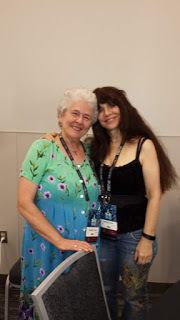 With Catherine Asaro, SFWA Pres the year I was SecretaryGreen Room to get something to drink and didn’t leave until with was time for Tea with Rising Young Star Editor, Part the First. Much Green Room and Editorial hilarity ensued, and many aspects of publishing, career, and projects past and future were discussed. Friday night was the DAW dinner, an extravaganza of fellowship and amazing French cuisine that ran until midnight. And Juliette had an early event the next morning, so --
With Catherine Asaro, SFWA Pres the year I was SecretaryGreen Room to get something to drink and didn’t leave until with was time for Tea with Rising Young Star Editor, Part the First. Much Green Room and Editorial hilarity ensued, and many aspects of publishing, career, and projects past and future were discussed. Friday night was the DAW dinner, an extravaganza of fellowship and amazing French cuisine that ran until midnight. And Juliette had an early event the next morning, so -- Insert glyph of sleep deprivation, followed by caffeine. Keep in mind that my normal daily allotment is one cup of black tea. Senior Editor and I grabbed large iced coffees and had a working, highly caffeinated gabfest, Part the Second. We discussed the future of Darkover (bright!) and where I might go with my original work. I’d already prepared for the chat with my agent and, needless to say, he was pleased with the outcome. (Stay tuned for future announcements.)
Later that afternoon, I hosted a KaffeeKlatch. This is a small group (alas, devoid of kaffee, er, coffee and, more importantly, coffee cake) sign-up-first meet-up with an author. To my delight, my table was full. Some of the people were old friends, others I knew only from social media, still others new to me. They asked questions and I held forth on everything from the current Darkover novel to future BVC releases to personal beacons of hope in a dark political time. Often the discussions included everyone present, which delighted me. Mostly I felt honored that so many had shown up just to spend some time with me.
At the end of the day, I was tiredissimo.
However, the next day (Sunday) dawned, so we wended our way back to the convention. I had a little time before my first event, so I hung out in the Green Room, where I met with old LA buddy Harry Turtledove and new-friend Henry Lien. Henry was about to give a reading, followed by Harry, so a group of us trooped off to listen. These were the only two events I actually got to attend, and they were both marvelous. Henry read from Peasprout Chen, Future Legend of Skate and Sword, for which he created a martial art form that incorporates kung fu and ice skating (since I studied kung fu san soo for 25+ years, we’d had a lively conversation in the Green Room). Harry’s story took us to an alternate State of Jefferson, where the governor is a Sasquatch. Both readings were utterly delightful.
I went from there to an autographing session. A group of authors were arranged at a table, with aisles leading up to each of us (so the overflow for the more popular didn’t spread out and block access to the rest). I never know what to expect from these events. Sometimes I have a modest line (and sometimes folks who’ve collected the anthologies containing my short fiction bring them in boxes) and sometimes no one shows up. I usually bring something to read. In this case, I also brought copies of my collection of short fantasy fiction, Pearls of Fire, Dreams of Steel, newly available in print. I also — and this is one of my favorite tricks -- brought a stack of bookplates. All too often, fans lament having left their copies of an author’s books at home (not realizing the author would be signing or maybe just not having enough room to bring them all) or have only an ebook edition. Ta-da! An autographed bookplate to the rescue! The author beside me, adorably young, was in this situation, so I whipped out my bookplates and offered them to her. Much happiness — fan and author, and me for making their days complete — ensued.
After a short break, I hurried off to my last scheduled event, a section of the writers’ workshop. Three participants had already submitted stories (or in one case the first 5K words of a novel) to a panel of pro authors for critiques. Especially for newer authors, this kind of one-off workshop can be a breakthrough. I’ve done many of them in the past and am still in touch with some of the participants who have gone on to major sales. I critique as I was taught, with a written analysis. The reasons for this are several. One is that it simply isn’t possible to absorb everything you’re being told about your story (from one critiquer, let alone three). The print-out gives the author something to refer back to, so they can just listen instead of struggling to do that and take notes at the same time. Writing down my thoughts forces me to be clear, logical, and to the point. I am not vulnerable to changing my mind based on what another critiquer has said. Even if we agree, I can’t jump on the bandwagon with “What He Said.” Of course, if we do agree, repetition ensues, but two or more viewpoints are never exactly the same, so they’re all still valuable.
One of the drawbacks of these workshops is that I don’t know the authors, where they are in their careers, and how they respond to having problems identified. I strive to avoid sarcasm, personal comments, or any hint of a dismissive tone. They took their stories seriously enough to submit them (and well ahead of time) so they deserve a thoughtful, serious critique. All in all, the participants seemed pleased with the feedback, and we ended on an upbeat note.
My last stop was a party given by my hostess, Juliette Wade, who runs a weekly Google Hangout on world-building. Much delicious food accompanied readings that depicted meals.
Then I wended my way home to my redwood-forested mountains, only to discover that the backlog of chores had not mysteriously taken care of itself while I was away. Such is the life of a convention-author.

Published on September 06, 2018 01:00
September 5, 2018
Today's Moment of Art
Published on September 05, 2018 01:00
August 31, 2018
Short Book Reviews: Magical Stitchery
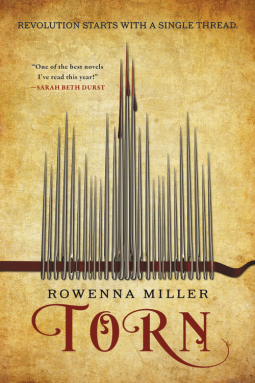 Torn, by Rowenna Miller (Orbit)
Torn, by Rowenna Miller (Orbit)In a land and time not too distant from our own Western European late 17th Century, first-generation immigrant Sophie is at last achieving her dream and pulling herself out of poverty. She’s managed to get a license to operate her dressmaking shop and even hire a couple of assistants. It’s enough to not only support her but to help her brother, Kristos, a day laborer who also has a dream: achieving fair working conditions for his comrades. But Sophie is no ordinary seamstress: she has a flair for design, and she’s inherited her mother’s magical gifts. For special projects for special patrons, she stitches in spells of love, of protection, of luck. Her upward mobility blinds her to the nativism and bigotry that give rise to endemic social and economic injustice. Just as Sophie gets her big break, creating spell-stitched garments for the aristocracy, the workers’ revolution begins to heat up. Initially nonviolent, the protests become increasingly confrontational -- and deadly -- under the direction of a mysterious leader, an academic who himself has foreign roots and who has an agenda of his own…and a use for Sophie’s special talents.
Sophie is an interesting character, and we see her changing world through the lens of her own frantic attempts at head-in-the-sand neutrality. In times of upheaval, those who have scratched together a little are even more desperate to hold on to it than those who have nothing. It would be easy to portray the workers’ movement as ill-conceived and naïve, playing into the hands of an unscrupulous, power-hungry manipulator. Certainly, from Sophie’s vantage, the revolution lurches from one fulminating disaster to another, and if the leaders would just go home and let her continue in her business-as-usual, that would be fine with her. In some ways, the noble ladies who include her in their salons are more politically astute, and more aware of how unstable their society has become. For this very reason, telling the story from Sophie’s viewpoint highlights the hypocrisies on all sides, for she is both an innocent victim caught in the cross-fire and complicit in the maintenance of an oppressive regime. Yet if bloody upheaval comes at too great a cost, what is a better path forward? Our world has yet to figure that out. Perhaps, as this series unfolds, Sophie’s world will.
The verdict: Surprisingly deep socially aware fantasy, plus a very cool magical system.

Published on August 31, 2018 01:00
August 29, 2018
Today's Moment of Art
Published on August 29, 2018 01:00
August 24, 2018
Short Book Reviews: World-Hopping Middle Grade Adventures to Delight the Parents, too
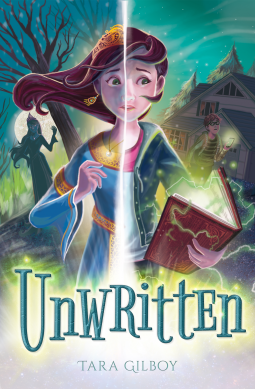 Unwritten, by Tara Gilboy (Jolly Fish Press)
Unwritten, by Tara Gilboy (Jolly Fish Press) A story in which a character finds her way into the world of a book has enduring appeal, and I’m at the front of the line to read such adventures to my favorite imaginary places. So when I read the description of a story in which our young heroine escapes from the world of a book into our own, I was intrigued. Unwritten fulfills the promise of its premise with quirky, immediately sympathetic people whose personalities warp and evolve as they are revealed through the plot. Gracie and her (single, waitress) mother are exiles from a storybook world in which, Gracie has always been told, she dies. Our ordinary world is the only place they’re safe from the evil queen. They keep their heads down, trying to not attract any attention that might draw the queen to them.
When the author of the book comes to town to do a bookstore signing, Gracie defies her mother and sneaks into the store to find out more about her own story. “I don’t know,” says the author, “that book never worked, so I threw away the manuscript.”
A series of mishaps, catalyzed by Gracie’s act of rebellion, catapult her, her mother, the man who might be her deadbeat father, and her best friend and his parents, along with the author, into the storybook world. Just as she was warned, the story itself begins shaping each character according to how she has been written. Despite her best intentions, Gracie finds herself acting out her own plot line, not as the tragic victim but as the villain.
The way the book played with subjective versus consensus reality, not to mention a plot paced briskly enough to hold the attention of younger readers, was enough to carry me along, through twists and turns, star-crossed love stories, and questions about how much control any of us have over our destiny. Although it’s marketed as Middle Grade (Gracie is 12), it’s a fine, fast read for fantasy lovers of any age.
The usual disclaimer: I received a review copy of this book, but no one bribed me to say anything about it.
An unusual disclaimer: Rumor has it that the author will be making a blog tour for her next book, including a guest appearance here. Stay tuned!

Published on August 24, 2018 12:53
August 22, 2018
Today's Moment of Art
Published on August 22, 2018 01:00
August 17, 2018
Cover Reveal: Lace and Blade 5
Lace and Blade 5, an anthology of elegant, witty, romantic fantasy, will be released on Valentine's Day 2019. The Table of Contents is here. And here is the gorgeous cover, trade papberback print version, designed by Dave Smeds:




Published on August 17, 2018 01:00
August 16, 2018
Where's Deborah?
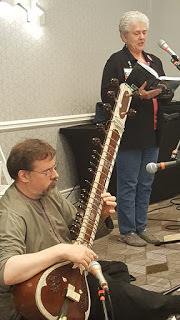 With Cliff Winnig at BayConI haven't been posting as frequently as I once did, but for the next few days I'll be even scarcer around here. I'm finishing up the second pass of the next Darkover novel, The Laran Gambit, before I meet with my NY editor this weekend.
With Cliff Winnig at BayConI haven't been posting as frequently as I once did, but for the next few days I'll be even scarcer around here. I'm finishing up the second pass of the next Darkover novel, The Laran Gambit, before I meet with my NY editor this weekend.If you're attending WorldCon, please stop by my KaffeeKlatch (Sat 5-6 pm 211B1 (San Jose Convention Center)) or my autographing (Sunday 12-1 -- I'll have print copies of Pearls of Fire, Dreams of Steel for sale, and free book plates). If not, have a grand weekend anyway and I'll see you once I come up for air!

Published on August 16, 2018 09:29
August 15, 2018
Today's Moment of Art
Published on August 15, 2018 01:00











